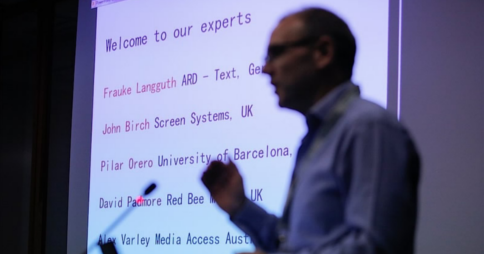Australian policy and legislation
Access 2020 predicting the future – five experts, 20 ideas
Caption quality: International approaches to standards and measurement
Media Access Australia has released a white paper entitled Caption quality: International approaches to standards and measurement. It focuses on issues surrounding the live captioning of TV programs, the difficulties in measuring caption quality effectively, and some of the solutions that have been proposed.
The white paper, which is the first in a planned series, was written by our Project manager for television, Chris Mikul, and sponsored by Red Bee Media Australia.
Top of page
Consumers condemn proposed changes to captioning regulations
Nine’s captioners audited for quality
Measuring caption quality is an emerging field, with many different systems being tried around the world. Ai-Media’s audit was scored using the NER (Number, Edition error and Recognition error) system developed by Pablo Romero-Fresco and Juan Martinez. This model recognises that different kinds of errors have different impacts and therefore the quality measure should take this into account.
Top of page
Australia urged to ease copyright restrictions on accessible books
Around the world copyright law, which protects the rights of authors, has inadvertently worked to restrict the number of publications which can be reproduced in braille and other alternative formats. The World Blind Union estimates that just 1-7% of all books published are made available to blind readers.
Top of page
Results of our survey on multichannel captioning
The survey looked at programs screened between 6am and midnight from 5 to 11 April 2014. During that period, the highest captioning percentage recorded on a commercial multichannel was 57 per cent on the Nine network’s Gem, while the lowest was 23 per cent on the Ten network’s One.
By contrast, captioning on the ABC’s three multichannel’s, ABC News 24, ABC2 and ABC3, stood at between 96 and 100 per cent.
Top of page
ACMA grants subscription TV caption exemptions
Under theBroadcasting Services Act, the ACMA has the power to grant exemption or target reduction orders to television services if providing captions for them would cause ‘unjustifiable hardship’.
Top of page
Measuring caption quality: our white paper
The white paper, which is the first in a planned series, was written by our Project manager for television, Chris Mikul, and sponsored by Red Bee Media Australia.
Top of page
ACMA given more discretion to investigate complaints
The change is one of the Federal Government’s ‘Repeal Day’ package of reforms to cut red tape which were announced yesterday. A spokesperson for the ACMA said, “This amendment will allow the ACMA to take no action on complaints that are, for example, misconceived, trivial, stale or inappropriately divert the ACMA’s resources and the resources of broadcasters.”
Top of page




